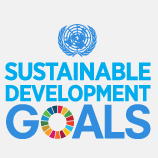 25 September 2015: The year 2015 is a landmark year for the United Nations: not only is it the Organization's 70th anniversary, but critically for the future, it sets out an ambitious new agenda and benchmarks, aiming to steer the course of the world towards sustainable development - this by 2030.
25 September 2015: The year 2015 is a landmark year for the United Nations: not only is it the Organization's 70th anniversary, but critically for the future, it sets out an ambitious new agenda and benchmarks, aiming to steer the course of the world towards sustainable development - this by 2030.
For the next decade and a half, the Sustainable Development Goals (SDGs) will guide the overarching work of all Governments, aid providers, UN entities and third parties such as the civil society and private sector. Designed to comprehensively address an interconnected range of issues, these new Goals are set to facilitate collective action within the coming decade and a half for a shared future.
The new agenda represent a significant departure from the Millennium Development Goals (MDGs). Issues related to the rule of law, justice and governance were, for instance, notably absent in the MDG framework.
Yet experience demonstrated that while the MDGs show a remarkable success, challenges remained through the destabilising effects of transnational organized crime, terrorism, corruption, money laundering, violence, exploitation, cybercrime and piracy, undercutting aid delivery and good governance. In many countries inequality has become starker, while political, economic, and social exclusion has, in part, contributed to the rise of sectarianism and violence.
|
"We recognize the importance of effective, fair, humane and accountable crime prevention and criminal justice systems and the institutions comprising them as a central component of the rule of law. We commit ourselves to holistic and comprehensive approaches to countering crime, violence, corruption and terrorism in all their forms and manifestations, and to ensuring that those responses are implemented in a coordinated and coherent way, along with broader programmes or measures for social and economic development, poverty eradication, respect for cultural diversity, social peace and social inclusion." Doha Declaration, 13th Crime Congress on Crime Prevention and Criminal Justice, April 2015 |
For the first time, the new global development agenda explicitly affirms that development requires peaceful and inclusive societies. SDG 16 - 'Promoting peaceful and inclusive societies for sustainable development, providing access to justice for all and building effective, accountable and inclusive institutions at all levels' - specifically ensures that the rule of law, peace and security are an integral part of the framework. Given the centrality of providing people-centered, rights-based and gender-sensitive solutions in promoting development, the rule of law and peace and security, UNODC's work is easily aligned with the 2030 Agenda for Sustainable Development.
UNODC's mandates represent universal aspirations embedded in the post-2015 development agenda. Fostering adherence to the rule of law, as a foundation to just and fair societies, is at the centre of the Office's work. The mission of UNODC is to contribute to the achievement of security and justice for all by making the world safer from crime, drugs and terrorism. The activities are grounded in a series of international instruments for which the Office acts as the worldwide guardian and advocate. They include the three international drug conventions, the United Nations Convention against Corruption, the United Nations Convention against Transnational Organized Crime and its protocols, the conventions and protocols against terrorism, and the United Nations Standards and Norms in Crime Prevention and Criminal Justice.
"I pledge, as UNODC Executive Director, that UNODC will work on behalf of the Sustainable Development Goals to tackle problems such as wildlife crime, human trafficking, drug abuse, HIV and violence against women, as well as promote health, justice and human rights," noted UNODC Executive Director Yury Fedotov while at the United Nations General Assembly where the Goals are currently being formally adopted. "In doing so, UNODC will continue to build and strengthen partnerships, both within and outside the United Nations system, to create just and fair societies," he added.
UNODC's comparative advantage lies in facilitating the ratification and implementation of the relevant United Nations conventions, standards and norms through a range of actions including: generating, analysing and exchanging comparative data on transnational threats; promoting cross-border cooperation and ensuring access to technical expertise, global knowledge products and best international practices to fight organized crime and illicit trafficking, corruption, and terrorism; and promoting criminal justice reform, law enforcement, drug demand reduction, and HIV and AIDS prevention. In pursuit of its diverse activities, UNODC promotes a gender sensitive approach and the respect and observance of human rights in line with established United Nations principles.
By promoting the rule of law globally, UNODC helps to build accountable and effective institutions and inclusive political processes which are key elements for peaceful and stable societies.